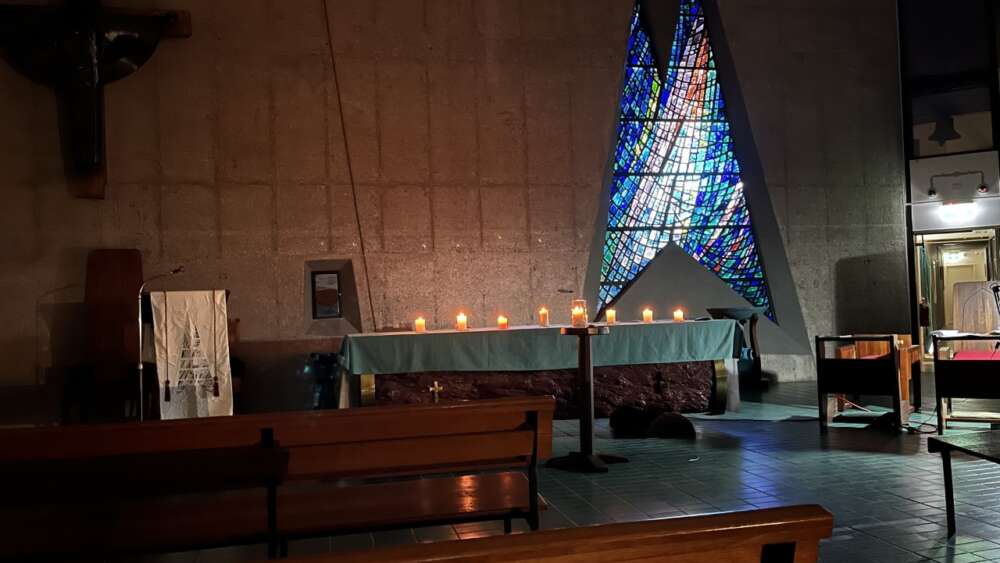Service of Shadows stirs deep emotion
Those walking in darkness have seen a great light.
The haunting strains of Barber’s Adagio for Strings played as nine candles flickered in the breeze from ceiling fans during the Tenebrae Service of Shadows for Christ Church Cathedral, Darwin, on Tuesday evening.
The warmth and aroma of the candles created an enveloping cocoon as the congregants sat silently, hearts burning inside us as the music soared to its plangent climax. The rainbow colours of the stained glass window shimmered vividly in the darkened cathedral and time slowed as we pondered what Jesus had to go through during the last week of his earthly ministry. The immortal dies – who can explore his strange design!
“The service of worship tonight is taken from an early Christian service for Holy Week called Tenebrae. Tenebrae is the Latin word for darkness or shadows,” Dean Rob Llewellyn said in his introduction to the service.
“Tonight we will seek to meditate on Christ’s pain and suffering – although for us it is only a tiny glimpse – as we hear Matthew’s narrative of the day of the crucifixion, in the light of the prophecies of Isaiah 53.”
It was so moving to consider the depth of the emotional, physical and spiritual pain that Jesus went through.
There were seven readings and it was wonderful to hear the national accents of each of the readers – American, South African, Indian, Australian, British – reflecting the marvellous truth that the gospel truly is for everyone.
After each reading, beginning with the song of Zechariah from Luke 1 and continuing with the passion according to the Gospel of Matthew, the Dean extinguished another candle until only a single candle, considered a symbol of our Lord, remained.
As it grew gradually darker, it was so moving to consider the depth of the emotional, physical and spiritual pain that Jesus went through during his crisis in Gethsemane, followed by his arrest, trial, betrayal and crucifixion.
The weight of our sin and the significance of his sacrifice were emphasised by readings from Isaiah 53 about God’s suffering servant – a man of sorrows, acquainted with grief. Despised and held in low esteem. Unjustly condemned, bearing the iniquity of us all.
After the reading in which Peter denies Jesus three times, there was a profound silence as each of us felt the weight of agony that this beloved disciple was left in as Jesus was led away to be condemned.
Then the response brings relief:
By the tender mercy of our God, he will give light to those in darkness and guide us into his peace.
“His blood be on us and on our children!” Oh, the irony! Yes, his blood is on us – and by his blood we are healed.
After the “Shadow of Trial” reading – in which Pilate reluctantly gives in to the crowd, releases Barabbas and sends Jesus to be flogged and crucified – the sixth candle was extinguished, followed by the sound of a hammer and three nails into wood.
I reflected again on the cry of the crowd: “His blood be on us and on our children!” Oh, the irony! Yes, his blood is on us – and by his blood, we are healed.
After the last candle was extinguished, the Christ candle was removed to signify the apparent victory of the forces of evil over good.
Then a loud percussive noise was heard, symbolising the earthquake at the time of his death (Matthew 27) and resurrection (Matthew 28:2). This was followed by the sound of cloth ripping, representing the temple curtain being torn apart and making the Holy of Holies exposed to public view.
“This is understood to represent God’s change towards us,” Llewellyn said. “Now we have direct access to him, no longer requiring the sacrifices of the priests, but one perfect sacrifice for our forgiveness of sins.”
I felt tears welling for those who won’t accept Jesus.
As the final symbol, the small but persistent flame of the Christ candle was returned to its place before the altar, in anticipation of the joy of ultimate victory.
As the soft but stirring sounds of the Adagio for Strings returned amid this single light, I felt tears welling for those who won’t accept Jesus as the perfect sacrifice for their sins, seeking false security in other ways to be right with God. Why else, I wonder, would God go to the extreme of sacrificing himself for our sake if there was any other way?
Email This Story
Why not send this to a friend?


